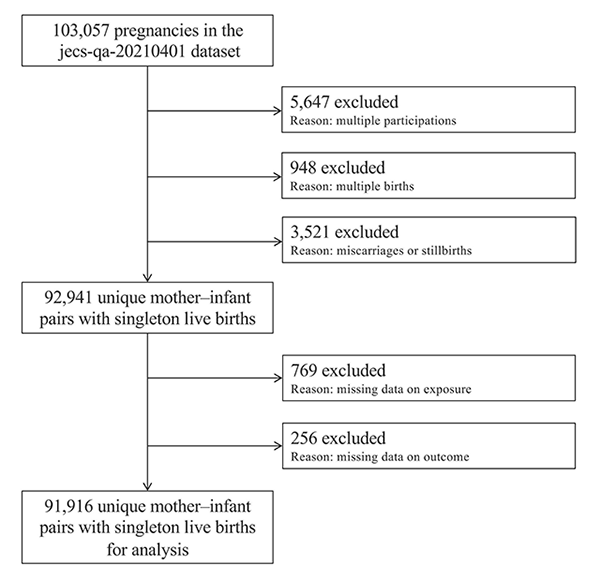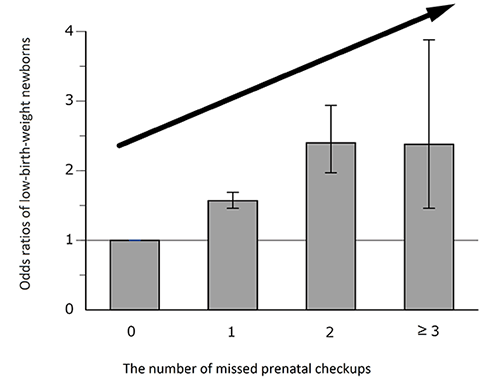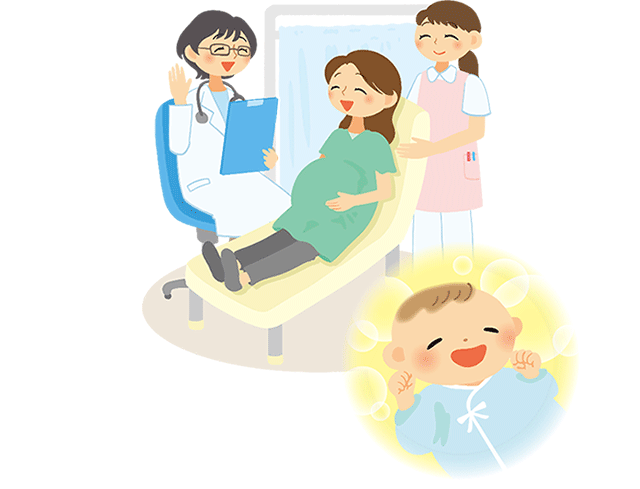Attending prenatal checkups can help reduce the risk of low weight at birth, find Tokyo Tech and Toyama University scientists in a recent study. Through statistical analyses of a large Japanese cohort, they pinpointed the main factors associated with mothers' attendance at prenatal checkups. These findings highlight key areas for future changes in policies and healthcare systems to start fixing the long-standing problem of low birth weight in Japan.
Previous research has shown that the weight of a baby at birth can significantly affect its health in the short- as well as long-term. Over the last 20 years, researchers have found evidence indicating that low birth weight (LBW) can have consequences on an infant's development, even leading to learning disabilities and behavioral issues.
Notably, Japan has a high incidence of LBW, estimated at 9.2% for all births in 2021, despite being a high-income country with advanced healthcare. The reasons underlying this incidence are not entirely clear. While certain studies have hinted that attending regular prenatal checkups is related to a lower incidence of LBW, the evidence is somewhat inconclusive.
Against this backdrop, Professor Mitsue Nagamine from Tokyo Institute of Technology (Tokyo Tech), in collaboration with researchers from Toyama University in Japan, has recently conducted a study on the matter. As explained in their paper published in Annals of Epidemiology, the researchers sought to uncover the relationship between LBW and Japanese mothers missing prenatal checkups. Additionally, they analyzed the background factors most closely related to attendance at prenatal checkups.
To gather data for the study, the researchers used a large dataset provided by the Japan Environment and Children's Study—a nationwide birth cohort study aimed at finding links between various environmental factors and children's health. After filtering the dataset, the researchers ended up with 91,916 mother–infant pairs for statistical analysis (Figure 1).

Figure 1. Participant flow diagram for the Japan Environment and Children’s Study
A nationwide birth cohort study, the Japan Environment and Children’s Study investigates the association between various environmental factors and children’s health.
One of the main findings of the study was an evident relationship between missing prenatal checkups and a higher risk of LBW (Figure 2). Prof. Nagamine, corresponding author of the study, highlights: "This result indicates the importance of taking measures to encourage attendance of prenatal checkups in Japan, unlike other high-income countries."

Figure 2. Odds ratios (95% CIs) for cases of low birth weight (< 2,500 g) according to the number of missed prenatal checkups.
There is increasing evidence that missing prenatal checkups is associated with a higher risk of infants having low weight at birth, which, in turn, can lead to serious health problems.
Another important finding was related to background factors that can be associated with attendance at prenatal checkups (Figure 3). The analyses indicated that single/divorced/widowed marital status, and a negative attitude towards pregnancy are mainly associated with a higher number of missed checkups. Moreover, having good overall mental and physical health was also related to lower attendance, especially during early pregnancy. The researchers suggested that this could be due to the misconception that having good health meant that checkups could be safely skipped.

Figure 3. Attending prenatal checkups can help reduce the risk of low weight at birth.
Scientists recently pinpointed the main factors associated with mothers’ attendance at prenatal checkups and uncovered its link with low birth weight in Japan.
In contrast, being employed and having good overall mental and physical health during mid-late pregnancy were related to a higher attendance at prenatal checkups. "These findings can help examine intervention policies for encouraging attendance and providing prenatal care. This includes considering the content and timing of the health information to be provided and determining which pregnant women potentially require a more focused intervention," remarks Prof. Nagamine.
Together, the findings of this study highlight focus areas that need to be considered by Japanese policymakers and healthcare systems to increase the attendance at prenatal checkups. "This work emphasizes the importance of multidimensional support during pregnancy, including the economic, psychological, and social aspects," concludes Prof. Nagamine.
Hopefully, these efforts will help reduce the incidence of LBW in Japan and protect babies from its potential consequences.
Reference
Authors : |
Mitsue Nagamine1,2, Kenta Matsumura2,3, Akiko Tsuchida2,3, Hidekuni Inadera2,3, and the Japan Environment and Children's Study (JECS) Group |
Title : |
Relationship between prenatal checkup status and low birth weight: a nationwide birth cohort–the Japan Environment and Children’s Study |
Journal : |
Annals of Epidemiology |
DOI : |
|
Affiliations : |
1Tokyo Tech Academy for Leadership (ToTAL)/Institute for Liberal Arts, Tokyo Institute of Technology
2Department of Public Health, Faculty of Medicine, University of Toyama
3Toyama Regional Center for JECS, University of Toyama
|
. Any information published on this site will be valid in relation to Science Tokyo.






